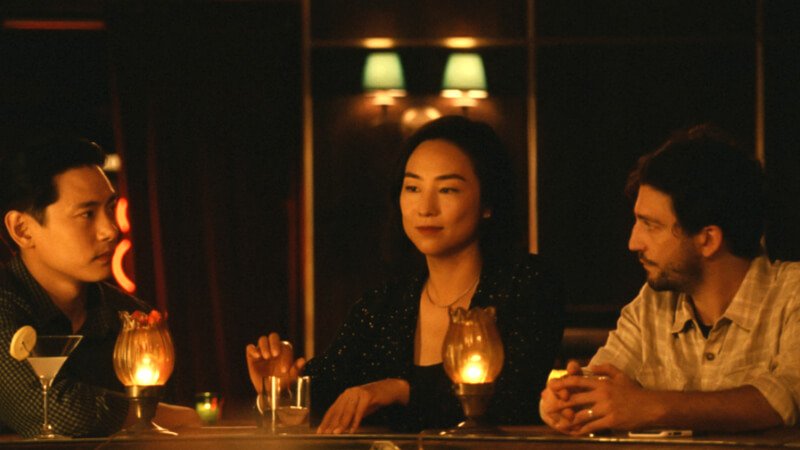
Yoo Tae-oh, Greta Lee, and John Magaro in ‘Past Lives’
Synopsis
A perfect beginning. Three people in a darkened bar, fixed in a halo of light. Asian man and Asian woman facing each other, talking. Caucasian man following along. Unseen onlookers are playing that game: guess what those three strangers are to each other. They think the Asians are brother and sister. No, maybe a couple. Actually, they can’t figure it out.
Flash back 24 years. Twelve-year-old Na-young and Hae-sung are best friends in elementary school in South Korea. They sit together, walk home together, compete for grades. Na-young’s mother, appreciating their special bond, organizes a play date for the two. Why? So they can make some nice memories before the family immigrates to Canada.
Flash forward 12 years. As students, they reconnect over a video call. Na-young is now Nora (Greta Lee), studying writing in New York City. Hae-sung (Yoo Tae-oh) has finished his compulsory military service and is studying engineering. They have long, reminiscing talks. But Nora fears she’s being distracted from her studies and her career. She proposes they take a break.
Life continues to steer them in different directions. Hae-sung heads for China, where he’s involved with a Chinese girlfriend. Nora meets and marries Arthur (John Magaro) during a writer’s retreat.
But finally … as adults Nora and Hae-sung meet again for a week in a darkened, chilly New York cityscape.
None of this is spoiler territory. Because now the real story begins, to answer that question: What are these people to each other?
See It
This is not your type of movie if you’re expecting dramatic confrontations or cutesy romantic comedy. It’s just an extraordinarily well written, well directed, and well acted rumination on “what might have been” versus “what is” versus “what will be.”
Besides Oscar nominations for both screenplay and best picture for first-time director Celine Song, Past Lives also earned Song and lead actress Greta Lee dozens of wins and nominations from professional societies and film festivals. Lee and costars Yoo and Magaro turn in finely nuanced and restrained performances that are perfectly calibrated to the intelligent script. Song does a masterly job, commanding your attention scene by scene so that you overlook how dialog-driven it is.
Through intimate and authentically candid conversations between Nora and Arthur, and then Nora and Hae-sung, we learn more about their relationships. What’s refreshing? The situation tempts us, like those anonymous onlookers, to peg them into neat Hollywood stereotypes. But writer/director Song subverts any expectations, giving us rounded and complex characters who are willing to admit their insecurities and fears – and to grapple with them openly.
It’s a mistake to try to view Past Lives through a completely Western, Hollywood-centric lens. Though the themes have some universal appeal, the central relationship between Nora and Hae-sung rests on social concepts that are uniquely Eastern. Nora explains it to Arthur eloquently:
There is a word in Korean. In-Yun. It means “providence” or “fate.” … I think it comes from Buddhism and reincarnation. It’s an In-Yun if two strangers even walk by each other in the street and their clothes accidentally brush. Because it means there must have been something between them in their past lives. If two people get married, they say it’s because there have been 8,000 layers of In-Yun over 8,000 lifetimes.
Writer/director Song has the courage to end Past Lives with a lump-in-the-throat sense of melancholy, leaving it up to you to contemplate what these people mean to each other in past lives, this life, and perhaps in lives yet to come.